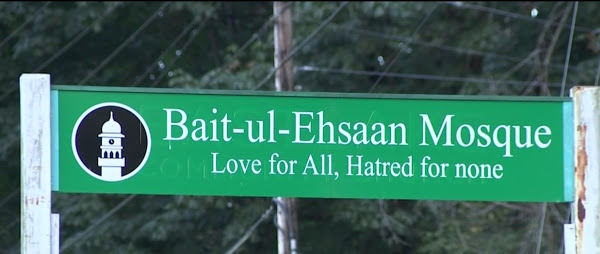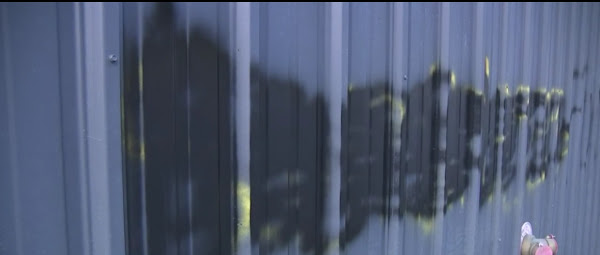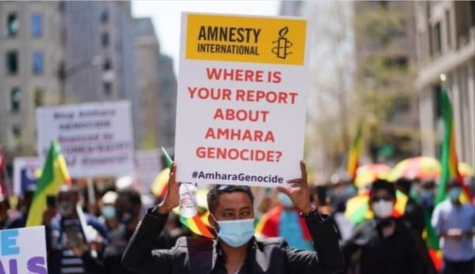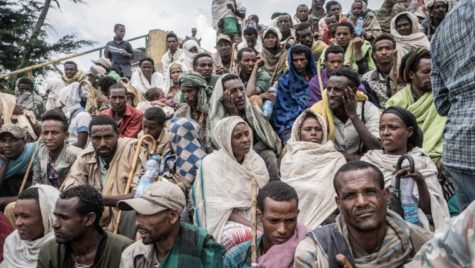Community Mosque Vandalized

The Bait-ul-Ehsaan Mosque located in Monroe is attended by Shorecrest student Mumina Ali and her family.
A few days following the anniversary of 9/11, the Baitul Ehsaan Mosque was vandalized. The message “F*** U” spray painted first in yellow and again in black. Attended by Shorecrest senior Mumina Ali and her sister, who is a sophomore, this recent manifestation of islamophobia highlights the need to address the issue within and throughout multiple communites.
The Baitul Ehsaan Mosque is located in Monroe. Mumina explains that she and her family have been going to the Mosque since she was five, despite multiple changes in location. “There’s a lot of room for the women to have their side, for the men to have their side, and for our school to be teaching,” Mumina says.
On Monday, which was the 16th anniversary of the 9/11/01 terrorist attack, the Mosque hosted a blood drive via the Blood Works Organization. The graffitied wall was discovered the following Friday as people arrived at the mosque for Friday prayer. The mosque does not have any security cameras, so the exact timing of the act is unknown, as is the identity of the vandal(s).
“Our theory is that it was the morning of the bombing in London––the train bombing,” Mumina says, referring to the detonation of a homemade bomb which injured thirty people early Friday morning in an underground train of London. ISIS later claimed responsibility for the attack, however there is no evidence indicating ISIS’ involvement. “We don’t know anything about the vandals, we don’t know what motivated them, we can only assume; but I do feel like the general political climate has influenced these concerns people have, maybe a little hate that was already instilled.”

Mumina described the graffiti, saying, “It was a lot of yellow, I feel like it was a phrase but they ran out of yellow spray paint, because they painted over it with black, and then just wrote ‘F*** U’.”
Immediately after discovering the vandalised wall, the Mosque called the Snohomish County Police Department as well as various media companies such as the Stranger, the Monroe Monitor, and the Seattle Times. “We aren’t looking for fame or attention, just to get the word out there,” Mumina says, “Just to say ‘Hey, this is happening in Seattle’––in a place you think is generally liberal. Like, its happening in this area.”
On the following Sunday, the Mosque hosted an event called Coffee, Cake, and Islam, a monthly occasion where people from all over the community and the neighborhood come to the Baitul Ehsan Mosque. Visitors eat cake, drink coffee, and ask Muslims questions about Islam and about their community, similar to a forum.
“We kind of took it as a blessing, a chance to get some more people in here so we can talk about it.” Mumina says, “We were hoping that the vandals would show up, just ‘cause we wanted to ask ‘What exactly are you fearing? And why do you feel so hateful?’ And maybe we can dispel some of those myths.”
The Mosque created the website TrueIslam.com to educate those who may have misconceptions about the true nature of the religion. “We want to contradict ideology with ideology, and explain how [Muslims and terrorists] are so clearly different; in my mind, they are two completely separate things, but for other people, they’re very related, which is why since this whole thing has happened, we really try to get the word out there.”
Subject of constant debate, these misconceptions and myths regarding the Islamic faith have become a point of fixation in the most recent election. Since taking office, the Trump administration has made their anti-Islam position clear; President Trump has attempted to restrict those from Islamic countries from entering the United States multiple times, and proposed the idea that Muslims should be forced to identify themselves to the government.
When asked about the effect of the political climate on the local Muslim community, Mumina said, “I don’t think that the political climate is what made some people hate muslims, but more reinforced their fear, and brought it to light.” She adds that since Trump has come into office, there seems to be more conversation from people across the political, religious, and social spectrum who appear to be united in resistance to the ideologies promoted by the current administration.
“I am always loud about things that I believe in, and I’m loud about supporting my faith,” Mumina says, “And many people don’t understand why. The reason that I’m so open about it is because if you know, and are confronted with someone who doesn’t believe that Muslims are peaceful, you can say ‘Hey, that’s not true, I know This Person’; then you have a direct connection.”
If one is to help fight acts of discrimination and ignorance, Mumina says awareness is key. “People are so afraid to come ask me questions. Even just asking, ‘how do you put your scarf on’––even that is showing that you want to know, and that is hopeful,” she says, “Get over the fear that you are going to insult someone; chances are they just want to talk to you.”








Mumina Ali • Nov 3, 2017 at 8:09 am
Mara,
This is amazing! Thank you so much! Your writing is beautiful.